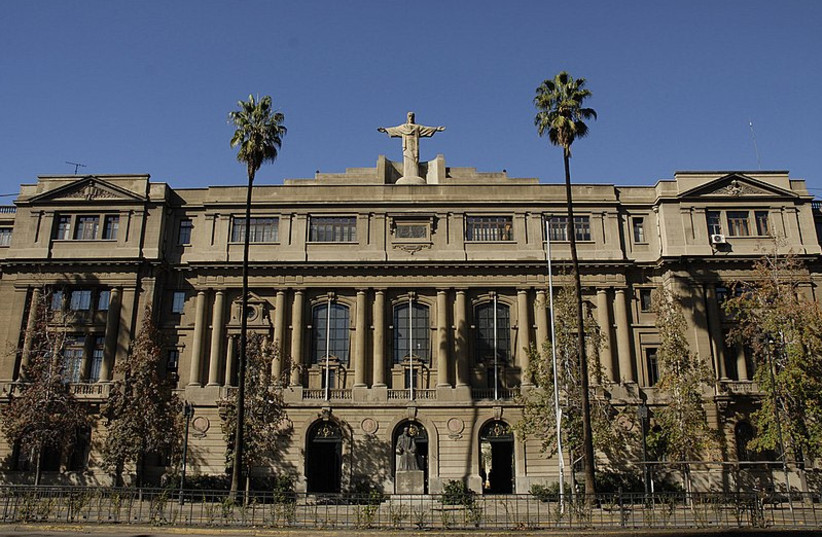As Israel faces an ugly uptick in violence and ongoing chaos due to the conflict at the Temple Mount, there is another conflict brewing thousands of kilometers away, and its ramifications may have a profound impact on the future of Jewish students on campuses.
Chile has long been a hotbed of anti-Israel extremism due to its population of half a million Palestinians, but the situation for Jewish students on campus grows worse by the day.
Sadly, the extremism in Chile that is often manifested as harassment of the Jewish community (in particular on campuses) has been largely ignored by Israel and the global Jewish world, as it has continued to grow.
Last week Chile’s Israel hatred finally went viral, with Chile even trending on Twitter in Israel during Chile’s “apartheid week.” The impetus? A visit from Arab-Israeli activist Yoseph Haddad, who spoke on multiple campuses about the cooperation between Arabs and Jews within Israel, contrary to the extremist narrative of the Palestinian community.
From Haddad’s arrival in Chile, social media exploded with harassment and curses against Haddad (and against me, as I also took part in the trip to Chile), and continued through the end of his visit.

In advance of his lecture at the Universidad Catolica in Santiago, where he was invited to address the Middle East studies department, flyers were distributed across campus calling his presence “violent” and demanding the cancellation of the event.
Yet despite demanding a “boycott” of Haddad and everything Israeli, the room was packed with students who patiently and respectfully listened for over an hour.
At the end of the event, several students (many of whom were from communist groups and not from the Palestinian community) stood up and began shouting “Free Palestine” before walking out dramatically.
The footage they recorded and shared with anti-Israel networks, which was later picked up by mainstream media, including TRT World and Al Jazeera, presented it as if they had disrupted the event, when in fact they had actually listened to Haddad and taken part in the event they claimed they had boycotted.
Another event, at one of the most anti-Israel campuses, Universidad de Chile, was “canceled” without ever having been formally booked. The event was supposed to have been held in a public space outdoors, but due to Palestinian students protesting, the university actually issued a statement claiming Haddad’s “event” was canceled because he didn’t have a permit.
The same week, the Palestinian students held a massive banner on this same campus saying “Free Palestine” in the same location, and uploaded it to social media with a message to the “Zionists” that the anti-Israel students are “waiting for them.”
At a time when Israel has been experiencing a wave of terrorism, this language is most certainly meant to intimidate and threaten not only Haddad, an Israeli-Arab who disproves their narrative, but the Jewish students on campus.
FOR YEARS, Chilean students have suffered from a climate of bullying and silencing without the proper backing and attention of the global Jewish community. Jewish students, of whom there are less than a hundred, are vastly outnumbered by Palestinian students, and are routinely harassed each time tensions with Israel arise. Some former students even reported having pictures of injured Palestinians being put on their classroom desks every day.
This type of antisemitism is appalling and little reported in the pro-Israel world, unlike the virulent antisemitism in Ireland and South Africa. The problem with ignoring what’s happening in Chile, however, is that the same path Chilean campuses have followed over the last few years is the path that US campuses are now rapidly taking.
It is not too late for Chile, but it is now harder than it would have been had the Jewish community previously shown more support. The Jewish students of Chile are on the front lines of the battle for truth on campus, and they are dealing with a hostile and aggressive enemy that seeks complete silencing of alternative opinions.
For that reason exactly, it is more important than ever that the Chilean Jews respond with strength and pride in being Jewish, as well as fearlessness when it comes to supporting Israel, even in the face of hatred. And it is more important than ever for the global Jewish community to support them, as well.
An apologetic approach has never worked in the past, neither in Chile nor in the US. We must stand united with Chilean Jews in the fight against antisemitism and anti-Zionism, and we must take Chile’s situation as an example, before it gets to that point on US campuses.
The only way to deal with a bully is to refuse to back down. We must not allow those who pursue an anti-peace agenda to silence Jewish voices.
The writer is the CEO of Social Lite Creative.
